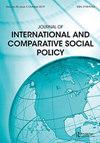The state role in civilising childcare – comparing policy intentions with childcare in Brazil and Denmark
Q2 Social Sciences
Journal of International and Comparative Social Policy
Pub Date : 2023-12-13
DOI:10.1017/ics.2023.12
引用次数: 0
Abstract
It has become universal to claim a relationship between social cohesion and quality public childcare. The more we invest in our children, the better the return later in life. We explore how childcare is used to strengthen social life by comparing the state role in civilising childcare as described in policy and educational guidelines. At one level, we find that policy intentions are framed by the idea of using childcare to reduce inequalities between people and social groups, and at another by the idea of civilising children to adapt to existing social structures. The analysis unfolds these two sets of intentions by showing how pedagogical ideas of child development become linked to the ways two very different states – Brazil and Denmark – formulate and organise ECEC policies as well as using childcare to bridge between people and social groups, and to civilising children to adapt to existing social structures.国家在文明育儿中的作用--比较巴西和丹麦的育儿政策意图
社会凝聚力与优质公共儿童保育之间的关系已成为一种普遍共识。我们对孩子的投资越多,日后的回报就越好。我们通过比较政策和教育方针中描述的国家在文明育儿方面的作用,来探讨如何利用育儿来加强社会生活。在一个层面上,我们发现政策意图的框架是利用儿童保育来减少人与人之间、社会群体与社会群体之间的不平等,而在另一个层面上,我们发现政策意图的框架是使儿童文明化,以适应现有的社会结构。分析通过展示儿童发展的教学思想如何与巴西和丹麦这两个截然不同的国家制定和组织幼儿保育和教育政策的方式联系在一起,以及如何利用幼儿保育在人与人之间、社会群体与社会群体之间架起桥梁,并使儿童文明化以适应现有的社会结构,从而展开这两套意图。
本文章由计算机程序翻译,如有差异,请以英文原文为准。
求助全文
约1分钟内获得全文
求助全文
来源期刊

Journal of International and Comparative Social Policy
Social Sciences-Sociology and Political Science
CiteScore
3.70
自引率
0.00%
发文量
18
 求助内容:
求助内容: 应助结果提醒方式:
应助结果提醒方式:


